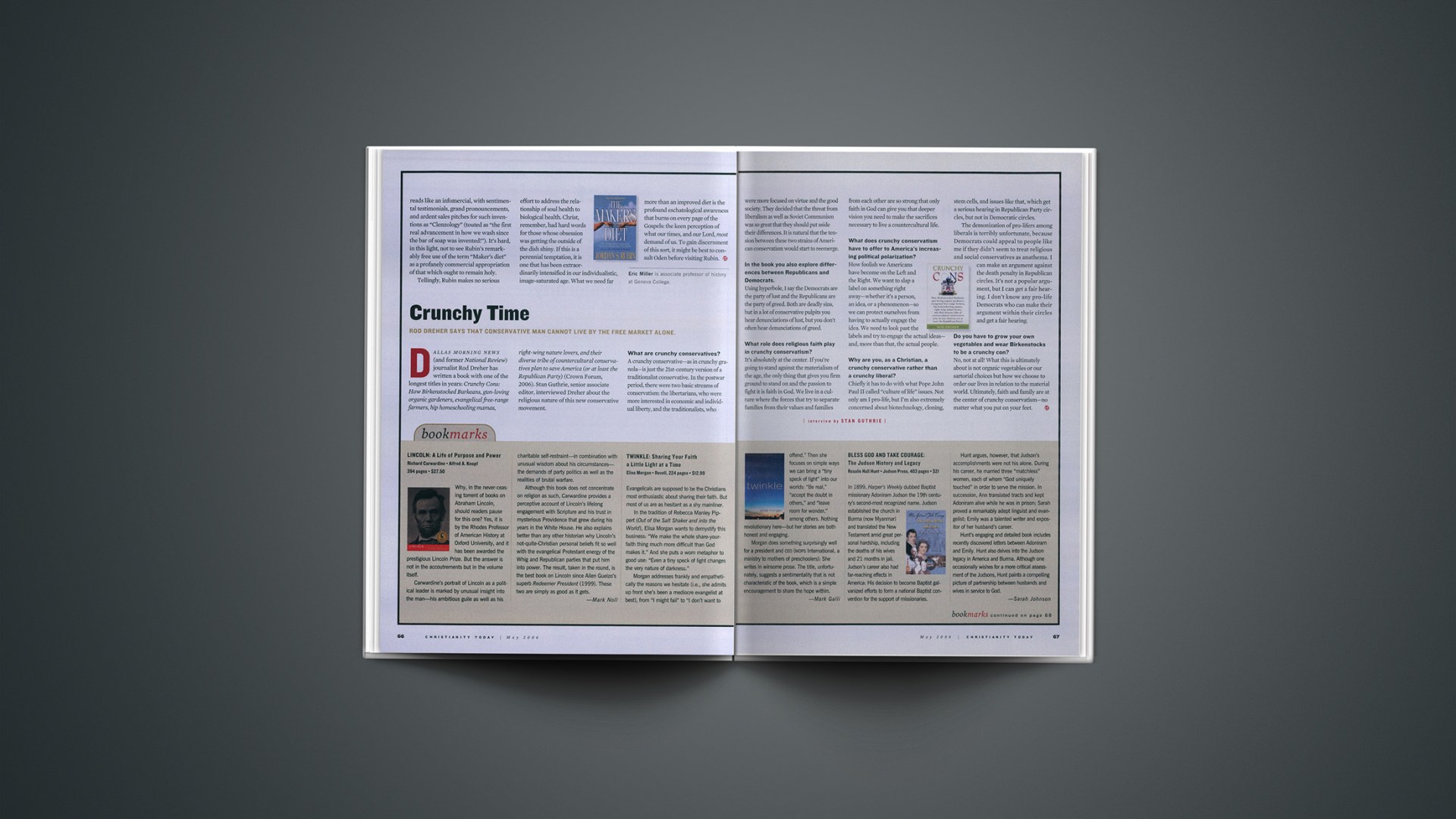Dallas Morning News (and former National Review) journalist Rod Dreher has written a book with one of the longest titles in years: Crunchy Cons: How Birkenstocked Burkeans, gun-loving organic gardeners, evangelical free-range farmers, hip homeschooling mamas, right-wing nature lovers, and their diverse tribe of countercultural conservatives plan to save America (or at least the Republican Party) (Crown Forum, 2006). Stan Guthrie, senior associate editor, interviewed Dreher about the religious nature of this new conservative movement.
What are crunchy conservatives?
A crunchy conservative—as in crunchy granola—is just the 21st-century version of a traditionalist conservative. In the postwar period, there were two basic streams of conservatism: the libertarians, who were more interested in economic and individual liberty, and the traditionalists, who were more focused on virtue and the good society. They decided that the threat from liberalism as well as Soviet Communism was so great that they should put aside their differences. It is natural that the tension between these two strains of American conservatism would start to reemerge.
In the book you also explore differences between Republicans and Democrats.
Using hyperbole, I say the Democrats are the party of lust and the Republicans are the party of greed. Both are deadly sins, but in a lot of conservative pulpits you hear denunciations of lust, but you don't often hear denunciations of greed.
What role does religious faith play in crunchy conservatism?
It's absolutely at the center. If you're going to stand against the materialism of the age, the only thing that gives you firm ground to stand on and the passion to fight it is faith in God. We live in a culture where the forces that try to separate families from their values and families from each other are so strong that only faith in God can give you that deeper vision you need to make the sacrifices necessary to live a countercultural life.
What does crunchy conservatism have to offer to America's increasing political polarization?
How foolish we Americans have become on the Left and the Right. We want to slap a label on something right away—whether it's a person, an idea, or a phenomenon—so we can protect ourselves from having to actually engage the idea. We need to look past the labels and try to engage the actual ideas—and, more than that, the actual people.
Why are you, as a Christian, a crunchy conservative rather than a crunchy liberal?
Chiefly it has to do with what Pope John Paul II called "culture of life" issues. Not only am I pro-life, but I'm also extremely concerned about biotechnology, cloning, stem cells, and issues like that, which get a serious hearing in Republican Party circles, but not in Democratic circles. The demonization of pro-lifers among liberals is terribly unfortunate, because Democrats could appeal to people like me if they didn't seem to treat religious and social conservatives as anathema. I can make an argument against the death penalty in Republican circles. It's not a popular argument, but I can get a fair hearing. I don't know any pro-life Democrats who can make their argument within their circles and get a fair hearing.
Do you have to grow your own vegetables and wear Birkenstocks to be a crunchy con?
No, not at all! What this is ultimately about is not organic vegetables or our sartorial choices but how we choose to order our lives in relation to the material world. Ultimately, faith and family are at the center of crunchy conservatism—no matter what you put on your feet.
Copyright © 2006 Christianity Today. Click for reprint information.
Related Elsewhere:
Crunchy Cons is available from Amazon.com and other book retailers.
More information is available from Crown books.
Rod Dreher wrote a column for the National Review about Birkenstock Burkeans.
Dreher's Crunchy Con blog is at Beliefnet.
Dreher defines crunchy con on NPR, where they also have a book excerpt.
The New York Times reviewed the book.
Chuck Colson discussed the book in a column at TownHall.
For book lovers, our 2005 CT book awards are available online, along with our book awards for 2004, 2003, 2002, 2001, 2000, 1999, 1998, and 1997, as well as our Books of the Twentieth Century. For other coverage or reviews, see our Books archive and the weekly Books & Culture Corner.










